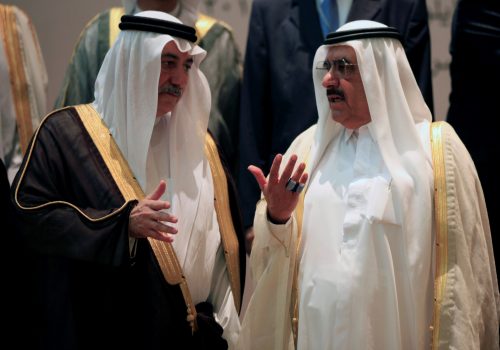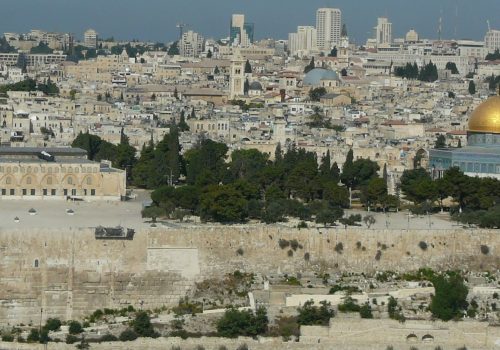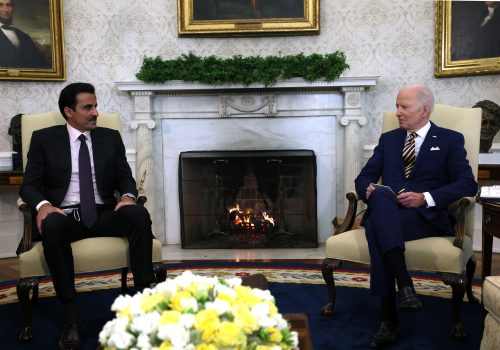Memorializing Sheikh Khalifa, transition, and restoring US-UAE relations
The passing of the President of the United Arab Emirates (UAE), His Highness Sheikh Khalifa bin Zayed Al Nahyan (1948-2022), occurs at a prominent time of growth and maturation for a sovereign UAE. The death of Sheikh Khalifa and the designation of his successor occurs during the fiftieth anniversary year of formal diplomatic relations with the United States, marking decades of increasing security cooperation vital to supporting US interests in the Middle East.
It is also at a time when bilateral relations are “going through a stress test,” as the UAE’s ambassador to the US, Yousef Al Otaiba, noted in March. His comments were made after Emirati officials saw the US response to Houthi attacks in February as weak, and US officials bristled at the UAE abstaining from the United Nations Security Council vote during the same month to condemn the Russian invasion of Ukraine.
In the years since its founding as an independent state, the UAE has sought to be a leader in the Middle East and North Africa. Now in this time of transition, it is incumbent upon the US to readily affirm its long-term relationship with the UAE and strongly reaffirm its shared strategic commitments to promote peace and security, support mutual economic growth, and expand educational opportunities.
Bridging the early days of statehood to the modern outward-facing UAE, Sheikh Khalifa was the eldest son of Sheikh Zayed, who was the UAE’s first leader after the federation of the seven Emirates in 1971.
Like his father, Sheikh Khalifa held the most powerful position among the seven semi-autonomous city-states extending along the strategic coasts of the Persian Gulf and the Gulf of Oman. The position of presidency derived from his standing as hereditary ruler of Abu Dhabi, the UAE’s largest and wealthiest emirate, and home to the federal capital. As President of the UAE, Sheikh Khalifa oversaw intense economic growth and managed a significant global financial crisis in 2008. The world’s tallest building, the Burj Khalifa, remains a tangible expression of commemorating his helping Dubai overcome crushing debt over a decade ago.
On May 14, the Federal Supreme Council, which is comprised of the rulers of the Emirate, unanimously elected and announced the successor to the late Sheikh Khalifa, his younger half-brother, Sheikh Mohammed bin Zayed—who has served as the UAE’s surrogate leader in a regency role since 2014 when Sheikh Khalifa suffered a stroke—is to formally succeed him as president and take the helm of OPEC’s third biggest oil producer. The UAE Constitution states the Supreme Council has one month to convene and choose the successor to the role of president, but that decision occurred within twenty-four hours. Following the council decision, Sheikh Mohammed bin Zayed is likely to name a new crown prince to replace himself. Traditionally, the choice would probably be one of his half-brothers, but he might instead choose his own eldest son, Khalid.
Sheikh Mohammed bin Zayed, or in US interagency parlance, “MBZ,” has traditionally regarded the US as his country’s most important ally. Through the relationships he developed across US presidential administrations, MBZ concluded that solidarity among the UAE, Israel, and the US against growing pernicious threats from Iran that was critical to the security of each nation as well as the region. In part because of the trust built up over the years with the US, MBZ led the UAE’s decision to normalize relations with Israel through the Abraham Accords in 2020. Not all of MBZ’s adventurous regional policies, however, have turned out as successful. His decision to end UAE combat operations in Yemen—concluding in February 2020, after five years of fighting—came despite the Houthi threat remaining acute and the military fight with the rebels, a stalemate.
As the UAE enters the announced forty-day period of mourning with a three-day suspension of work in all ministries and the private sector on May 13, including flags to be flown at half-staff, expressions of condolences are being made around the world by various heads of state and public figures. A state funeral with the requisite honors is likely to occur, and such an august public ceremonial mourning is an appropriate opportunity for the US to best express respect and convey commitment to its Emirati friends.
To convey condolences, President Joe Biden will send the obligatory mourning delegation to the UAE inclusive of cabinet ranked officials, as protocol dictates, but the president should also be there. In this part of the world, national security considerations often hinge on personal relationships. A presidential visit would go a long way toward restoring the solid bonds between the US and UAE. The proverbial “showing the flag” isn’t enough under current conditions.
Considerations for the investment in a long-term relationship require a thoughtful and tactile response. Commemorating the deep relationship with the UAE, the president of the United States should be present, and personally honor the legacy of Sheikh Khalifa with condolences as well as congratulations to Sheikh Mohamed bin Zayed. The image of President Biden in Abu Dhabi would serve as a visible commitment toward growing the US-UAE relationship, affirm close bilateral coordination, and make clear the intent to secure further cooperation with the now successor of the late Sheikh Khalifa.
R. Clarke Cooper is a nonresident senior fellow at the Atlantic Council, former assistant secretary at the US Department of State, a former senior intelligence officer for the US Joint Special Operations Command, and a combat veteran.
Further reading
Mon, Sep 13, 2021
Defusing Saudi Arabia-UAE tensions through economic rebalancing
MENASource By
By identifying the economic imbalances contributing to the breakdown, recalibration is possible to rebuild a more balanced relationship that circumvents the zero-sum game that has given rise to the Riyadh-Abu Dhabi dispute.
Tue, May 10, 2022
Building a New Middle East – A Conversation with US Ambassador to Israel Thomas R. Nides
Event Recap By
On May 3, the Atlantic Council’s Middle East Programs hosted a public event with Ambassador Thomas R. Nides, US Ambassador to Israel.
Thu, Mar 3, 2022
As Qatar becomes a non-NATO ally, greater responsibility conveys with the status
MENASource By R. Clarke Cooper
Although Qatar’s eligibility for MNNA status doesn’t automatically include a mutual defense pact with the United States, being designated a MNNA state is very much a declaration that the United States wants a deeper and stronger security-cooperation relationship with Qatar and expects the country to play a greater role in regional security.
Image: The flag of the United Arab Emirates flies at half-mast among the downtown city skyline after the death of the country's President Sheikh Khalifa Bin Zayed Al Nahyan in Dubai, United Arab Emirates, May 13, 2022. REUTERS/Christopher Pike


